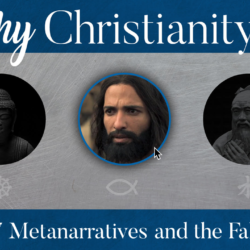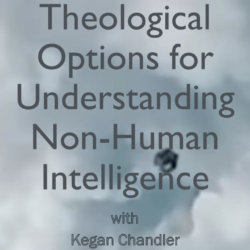 Have you ever been in a corn maze? The reason they work is because you can only see right in front of you. If you had a live drone feed, you could easily orient yourself and find the way out. This is the benefit of history. We live in a postmodern culture, but it’s hard to see or understand what that means since we’re surrounded with it. In this exceptional presentation, Kegan Chandler guides us through the history of premodernism, modernism, and postmodernism so that we can orient ourselves to how many people in our world think and approach life. Not only will this give you a drones-eye perspective of our current situation, but it also will help you understand how to better share your faith with postmodern people.
Have you ever been in a corn maze? The reason they work is because you can only see right in front of you. If you had a live drone feed, you could easily orient yourself and find the way out. This is the benefit of history. We live in a postmodern culture, but it’s hard to see or understand what that means since we’re surrounded with it. In this exceptional presentation, Kegan Chandler guides us through the history of premodernism, modernism, and postmodernism so that we can orient ourselves to how many people in our world think and approach life. Not only will this give you a drones-eye perspective of our current situation, but it also will help you understand how to better share your faith with postmodern people.
—— Notes ——
Metanarratives and Postmodernism (Kegan Chandler)
- What is postmodernism?
- How in the world did we get here?
- Where do we go from here?
Postmodernism is a worldview based on French philosophers, Derrida, Foucault, Lyotard w/ these four characteristics:
- no objective truth (Derrida)
- only interpretations (Derrida)
- no meta-narrative (Lyotard)
- interpretation in society results from power not truth (Foulcault)
meta-narrative: overarching account that provides a pattern or structure for ppls beliefs and experiences
postmodernist mission: deconstruction
- identify social constructs in the world and break them down
if everything is deconstructed, what do we fill it with?
- our experiences
- community
First Star Wars w/ Luke vs. last star wars w/ Luke, deconstructs everything
premodernism
- belief in objective truth
- problem: priestly class determines truth
- problem: superstition
- authority structure suffocated learning and creativity
- Renaissance was a way to recover art and classics that the church had suppressed
premodernism crumbles
- Reformation
- Galileo defeats Aristotle (dropping 2 lead balls from leaning tower of Piza)
- this challenges authority of Aristotle
- heliocentricity also challenges church’s imprimatur of Ptolemaic geocentricity
modernism
- rejection of authority
- time and numbers don’t guarantee truth
- reason alone can find truth
- naïve optimism (holocaust, communism, eugenics)
- epistemological revolution, exalting empiricism, which reduced miraculous to superstition
- we can save the world if we just apply reason and science
postmodernism
- glad that modernism rejected authority
- reject the idea that human institutions and states can save us
- only the individual can be free
- get rid of objective truth to build our own realities
- rejection of meta-narratives
- distrust that reason can bring enlightenment or satisfaction
pomo is good for Christianity b/c
- it defeat naïve secular utopian dreams
- defeats empiricisms
- accepts supernatural, transcendent
- ennobles the individual’s journey of discovery
problems w/ postmodernism
- the statement “there is no objective truth” is self-defeating
- you can always disagree, saying “that’s just your interpretation”
- I can just say “pomo is wrong” and no one can disagree b/c then they would have to appeal to objective reality
- just b/c everyone has their own interpretation doesn’t mean that there isn’t one correct one on any given subject
a post-postmodernism worldview
- belief in objective truth
- belief in the right authoritative sources of truth (scripture)
- value reason, but don’t believe it alone can lead is into truth
- also need revelation
- true human happiness is only available when Christ returns
- a worldview built on hope
—— Links ——
- Visit Kegan Chandler’s websites thegodofjesus.com and burieddeepblog.wordpress.com
- Listen to other podcasts with Kegan Chandler
- Check out the other talks in this Apologetics Conference
- For more, here’s an entire Apologetics Class
- Intro music: Jazzy Frenchy by bensound.com. Licensed under Creative Commons: By Attribution 3.0 License.






